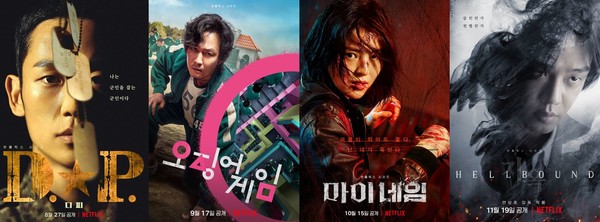Netflix has met its dreamland in Korea. This year alone, it invested in four different Korean series, which have all succeeded. It is no exaggeration to describe this success as a jackpot. Netflix stocks rose by 30% since the release of D.P., and the latest Hellbound has become the most-watched series in 84 countries on the day of its release. Not to mention that their number of subscribers has increased by 6 million since the start of the year. What is behind this craze for K-dramas? In a single phrase: they had the best story in the best opportunity.

While the physical settings of these shows are surreal, the audience can easily relate to the shows that too well resemble our current society. They reveal the bitter reality without beautification. Individuals are used as pawns by a dominant system they cannot penetrate. In D.P., conscripted soldiers are maltreated and have to endure forced labor and harassment. They are locked in a small society they cannot escape. In Squid Game, the highly capitalist society determines a person’s value based on their economic class. People with debt and poverty are more easily provoked to commit crime. Such contexts are not unique to Korean society. Veterans from countries ranging from Russia to the US have empathized with the military harassment displayed in D.P. Viewers from Japan and France related their own societies with how the society in Squid Game ignores those that “failed” in the competition. The similar experiences viewers have from their own despicable society to the subjects portrayed make the shows appealing to the global audience.
Just like how the shows accurately reflect our society, the protagonists in the story are not superheroes either; rather, they are quite the contrary. They even fall short of being ordinary citizens with ordinary lives. Kihoon, the protagonist of Squid Game, is divorced, is in great debt, and is addicted to gambling. His only daughter is immigrating to another country. Not to mention that his mother is ill — yet they are too poor to afford medical treatment. The situations of other protagonists are not that different. They are the Jean Valjeans in 21st century Korea. The audience loves them because they sympathize with their situation. It is also notable that their misery was not entirely their fault — they have tried to change their lives, only to fail. Kihoon, for instance, was fired unfairly from his company that he worked at for more than a decade. He then tried to open a grill but failed as well.
The protagonists struggle to maintain their character independence while others around them change. They are not perfect. They often commit immoral activities. But they know what is good and try to act accordingly if they can. And at the end, they fight for what they believe is right. Junho of D.P. tries his best to be compassionate even toward deserters. He refuses to participate in harassment, a “normal” culture in the army. He volunteers himself to a mission that could endanger his life — just to save innocent lives. This would be the type of strength and justice the audience would want to see practiced by ordinary people like themselves.
Furthermore, these shows don’t require much time to finish. Hellbound has a total screen time of 331 minutes — one could even finish the show in a single afternoon. They are a quick watch compared to shows from other countries, like Turkish shows in which a single episode can last up to 2 hours. Hence, Netflix K-dramas are more accessible to audiences that have little acquaintance with Korean media. However, having a short screen time does not mean they are lacking in development. Such short screen time is possible because not a single minute is wasted. Because the dramas are made mostly with Netflix investments, there is no unnecessary product placement nor needless excessive stories. Because product placement provides additional investment, K-dramas normally include such indirect advertisement in their shows. Yet, such attempts often result in unrealistic situations such as a character supposed to be suffering from poverty using the latest Galaxy series and wearing Italian fur coats. Hence unlike normal K-dramas, every moment of the Netflix series is focused on crucial scenes, captivating the audience throughout the whole show.
Netflix K-dramas appealed globally with compelling characters and focused plots that captured the audience. The stories had realistic backgrounds that resemble modern society. What perhaps made them relevant to both Western and Eastern audiences is that Korea has a unique coalesced society of Westernized modern development while maintaining an Eastern culture. Yet, it must be noted that this “boom” was aided by the global quarantine, as people with limited options for entertainment increasingly turned to online media. It was indeed the best opportunity for shows to present themselves as an alternative to other sources of entertainment. Hence, Netflix and the production companies must not celebrate an early victory but must be prepared to satisfy these new fans for them to remain loyal in the long-term.

